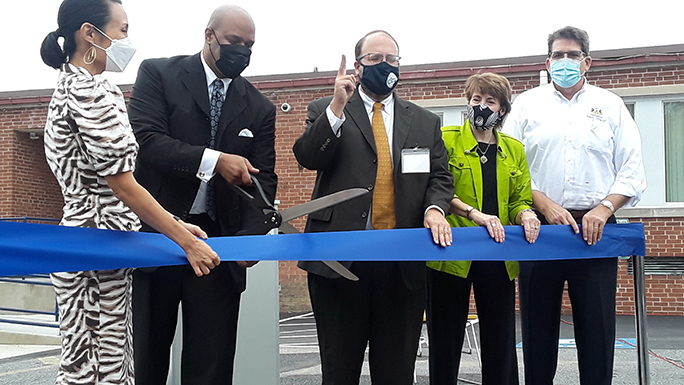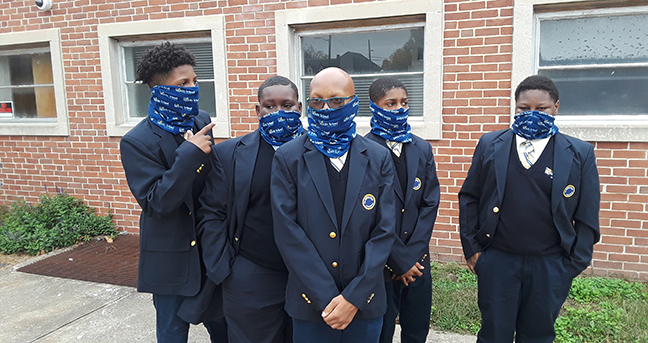“Gradual” Reopening Set for Early May
Gov. Tom Wolf has set a date of May 8 to begin a “gradual” reopening of the state’s economy, though he urged residents to continue practicing social distancing and other safety measures.
Wolf set that target date to begin the process of business re-openings, though he emphasized that ending the shutdown would be regional, likely beginning with the northwest and north-central regions that have shown relatively few confirmed cases of COVID-19.
“We’ve done the mitigation stage in a measured, commonsense way, and the plan is to move out of this stage in a measured, commonsense way,” he said.
The areas hardest hit by the COVID-19 pandemic would likely to be the last ones to have the business shutdown end.
“We’re going to do this on a regional basis,” he said. “If we open in a rural area, it doesn’t mean we’ll end the shutdown or stay-at-home order in a place like Philadelphia.”
Wolf also stressed that Pennsylvanians should continue measures such as staying at home and social distancing, even after shutdown orders end.
“If we go too quickly, this might be unsafe for people,” he said. “If we move too quickly, people may not want to go to work because they’re afraid, or may not want to go into a store to buy something because they’re afraid.”
Wolf also set six criteria for businesses to reopen, including:
- Re-openings will be “data driven,” will be based upon “quantifiable criteria” and will be targeted and regional.
- Before allowing businesses to reopen, the state will issue “guidance and recommendations” for employers and workers.
- Reopening will necessitate the availability of “adequate personal protective equipment” and “diagnostic testing.”
- Reopening will require a monitoring and surveillance program allowing the commonwealth to deploy “swift actions” for containment or mitigation.
- Protections for vulnerable populations, especially at congregate care facilities and prisons, will remain in place throughout the reopening process.
- Limitations on large gatherings unrelated to work will remain in place for the duration of the reopening process.
Wolf also set May 1 for the resumption of residential and commercial construction projects that have not been given an exemption under the current shutdown order. In Pennsylvania, the construction industry has been especially vocal in protesting the mandated closing of “non-life-sustaining” businesses.
State Street Redesign Funded
Harrisburg took a step towards making State Street safer for pedestrians last month, agreeing to allocate money for a final road design.
City Council unanimously approved hiring civil engineering firm Wallace, Montgomery & Associates to complete the “State Street Rapid Response” design, including an expenditure of $57,500.
“State Street is the most dangerous street in the city,” city Engineer Wayne Martin told council members through the virtual meeting.
Over a year ago, Harrisburg released its “Vision Zero” action plan for the city, with a goal of eliminating pedestrian deaths. The initiative came after numerous pedestrian fatalities on city streets, especially on state-owned State Street on Allison Hill.
Harrisburg made improving State Street its number-one “Vision Zero” priority, but its plan was rejected at the district level by the state Department of Transportation.
Martin explained that the city then appealed directly to PennDOT’s top officials, including the former and interim transportation secretaries.
“We agreed on the configuration for the State Street corridor, a path forward, if you will,” Martin said.
Wallace Montgomery now needs to finalize the engineering design. The total project includes numerous changes to State Street, including a narrower road, bus stop improvements, new ADA ramps, new curbing and lighting.
The $57,500 design expense will come from the city’s engineering budget and includes design revisions, highway occupancy permits and the cost of a public meeting, Martin said.
The public meeting was originally slated for last month. Martin said that he now hopes for a June meeting, but added that the timing is uncertain due to continuing social distancing requirements.
The city, Martin said, still must firm up a final cost for the actual roadwork and identify funding sources. He said that he hoped to fund the project through state and other grant monies.
“PennDOT has not said they would pay for some of these improvements, but they haven’t rejected it either,” he said. “They left that door open. So, we will seek funding from PennDOT and other sources of funds.”
Martin said that he hopes the actual roadwork will begin in the late summer, but the timing depends upon lifting COVID-19 mitigation restrictions.
Schools to Remain Closed
Pennsylvania schools will remain closed for the rest of the academic year, the state ordered last month.
Gov. Tom Wolf said that the step was necessary to help prevent the spread of the COVID-19 virus.
“We must continue our efforts to mitigate the spread of the virus during this national crisis,” Wolf said. “This was not an easy decision, but closing schools until the end of the academic year is in the best interest of our students, school employees and families.”
Wolf first ordered schools closed in March, setting an early April reopening date. He then said that schools would be closed until further notice before the final announcement that they would remain shut through June.
The closure mandate applies to all schools, including public, private and cyber charter schools.
Wolf said that, although schools are closed, they’re “strongly encouraged” to continue to offer education in “the most appropriate and accessible ways possible,” whether through online or paper-based lessons.
Schools will stay closed until Wolf lifts his “stay at home” order and the state explicitly allows them to reopen, according to the PA Department of Education (PDE).
“As schools and communities adapt to the prolonged school closure, PDE will continue to work with our state, educational, and business and nonprofit partners to meet the needs of students,” said education Secretary Pedro Rivera.
Home Sales Stable
Harrisburg area home sales were relatively stable in March, with sales units and prices mostly unchanged from the year prior.
For March 2020, 551 residential units sold in Dauphin, Cumberland and Perry counties, compared to 558 units in March 2019, according to the Greater Harrisburg Association of Realtors (GHAR). The median price increased to $180,000 from $175,000 over the same period.
In Dauphin County, 278 homes sold at a median price of $169,000 compared to 276 homes at a median price of $162,000 in the year-ago period, said GHAR. In Cumberland County, 242 houses sold compared to 255 the previous March, while the median price rose slightly to $205,000 versus $202,000, according to GHAR.
Perry County had 31 homes sales versus 27 a year ago, with a median price of $171,500 compared to $160,000 in March 2019, GHAR said.
So Noted
Artsfest is going virtual this year after the three-day live event in Riverfront Park was cancelled due to restrictions on public gatherings. Harrisburg Mayor Eric Papenfuse asserted that that “virtual” Artsfest is expected only for this year, and the city intends to bring the event back to the park over Memorial Day weekend in 2021. Harrisburg’s other major summer waterfront celebration, Kipona, is still scheduled for Labor Day weekend.
Don McKenna has been named president of Penn State Health Hampden Medical Center, the 300,000-square-foot, acute care hospital in Cumberland County scheduled to open in 2021. In this role, McKenna will oversee an initial workforce of about 650 full- and part-time clinical and support staff, with expectations that the workforce will grow to 1,000 within three years. McKenna previously was the president and chief executive officer of Jupiter Health in Florida.
Gamut Theatre Group last month cancelled all live events through Sept. 1. This includes June’s popular annual “Shakespeare in the Park” performances. Founders Clark and Melissa Nicholson said they made the decision out of an abundance of caution because of the spread of the COVID-19 virus.
Impact Harrisburg and the city of Harrisburg last month launched a “Business Stabilization Program,” a $1 million fund that will provide up to $10,000 to city businesses that have lost revenue due to the COVID-19 emergency. Those interested in applying for a grant should visit www.impactharrisburg.org.
Open Stage went virtual last month, staging the first act of its production of “Angels in America” via a Zoom live-streaming event. The second act, titled “Perestroika,” continues this month on Zoom. For more information, visit www.openstagehbg.com.
Shannon Gority has been named the new executive director of the Pennsylvania office of the Chesapeake Bay Foundation. Most recently, Gority worked as a consultant for both government and private industry and, before that, was the first CEO of Capital Region Water. She holds degrees from Juniata College and Penn State in civil and environmental engineering
In Memoriam
Gerald Welch, a director for the Harrisburg school board, died last month due to complications from COVID-19. Welch, 56, won his board seat last year, one of five challengers to emerge victorious as part of a reformist slate. Welch often stated his belief in the power of education, citing his own experience as a high school dropout who later would go on to earn a master’s degree in social work.
Changing Hands
Adrian St., 2454: M. Makinde to C. Grant & M. Rinaldi, $70,500
Barkley Lane, 2506: Seneca Leandro View LLC to B. Mehaffie, $88,900
Barkley Lane, 2518: B. & C. Smith to L. & B. Grotjan, $88,000
Berryhill St., 2106: E. Irby to P. Bates, $53,000
Boas St., 426½: M. Richards to N. Patterson, $142,000
Briggs St., 235: JLS Rentals LLC to U. Maillet, $190,000
Briggs St., 1919: G. Neff to C. Pizarro & L. Mendieta, $38,500
Chestnut St., 1911: S. Jawhar to C. & N. Ovalles, $45,000
Cumberland St., 1723: T. Hardison to K. Robinson, $85,000
Derry St., 2100: JOG Investments LLC to OC Highway LLC, $45,000
Derry St., 2606: S. Carper to DLK Properties LLC, $48,000
Emerald Ct., 2456: Secretary of Veterans Affairs to PA Deals LLC, $67,000
Emerald St., 221: M. Horgan to J. Gilchrist & N. Matrese, $144,900
Emerald St., 652: E. Vielle to D. Fernandez, $30,000
Fulton St., 1704: R. Ziegler to W. Ferguson, $143,500
Grand St., 915: H. Senior to A. & A. Zlogar, $104,000
Green St., 2015: J. Blouch to B. Koreny, $217,500
Greenwood St., 2116: Crist Holdings LLC to J. Valverde, $40,000
Holly St., 1947: Federal Home Loan Mortgage Co. & Green River Capital LLC to R. Grullon, $54,000
Hudson St., 1105: E. Nowlin to B. Barkdoll, $129,000
Hudson St., 1241: T. Poole to P. Oliverio, $130,000
Jefferson St., 2239: Dobson Family Limited Partnership to HBK Properties 1 LLC, $44,000
Lewis St., 421: K. Wakefield to J. Barber, $125,000
Linden St., 128: Secretary of Housing & Urban Development to D. Vanlee, $30,500
Logan St., 2208: CR Property Group LLC to J. Lessley, $100,000
Logan St., 2415: T. Drazien to Z. & S. Shatto, $64,000
Luce St., 2304: L. & A. Scotto to CR Property Group LLC, $44,000
Market St., 1223: Crist Holdings LLC to SNB Real Estate Solutions LLC, $30,000
Market St., 1615 and Argyle St., 10 & 12: R. & N. Ressler to N&R Group LLC, $90,000
Muench St., 202: L. & K. Martin to PD Estate Properties LLC, $85,900
Muench St., 211: J. Laubach to M. & H. Hess, $197,500
Muench St., 271: WCI Partners LP to C. Halpert, $107,500
N. 2nd St., 1701: C. Troutman & B. Jackson to SPG Capital LLC, $125,000
N. 2nd St., 2700: J. Norris to M. Norford & S. Bernard, $264,900
N. 3rd St., 1642: Saratoga Properties LLC to Heinly Homes LLC, $55,000
N. 5th St., 1730: E. Bish to M. Davis, $82,500
N. 5th St., 2206: J. Caputo Jr. to D. de la Cruze, $49,000
N. 16th St., 1008: Truemac Homes LLC to L. Storm, $82,000
N. 16th St., 1214: Susquehanna Valley Investment Properties LLC to F. Guzman, $42,000
N. Front St., 321: Clark Resources Inc. to 321 N. Front St. LLC, $450,000
N. Front St., 2515: 324 Mishika LLC to Penn Medical Real Estate LLC, $350,000
Peffer St., 221: C. Chapman to N. Laume, $123,500
Penn St., 2211, 2213 & 2219: WK Rentals LLC to PA Deals LLC, $210,500
Penn St., 2220: Limitless Possibilities Inc. to Inder Group Real Estate LLC, $40,000
Race St., 544: L. Fisher to Impact Access Inc., $87,500
Radnor St., 528: E. Chattah to G. Romero, $80,000
Royal Terr., 123: A. Eckert to NHP Real Estate Development LLC, $39,000
Royal Terr., 125: J. Holmes to El Pejano Trucking LLC, $32,000
Rudy Rd., 2237: F. Prunty to J. Flower & J. Shamitko, $192,000
Showers St., 624: K. Kearn to Z. Einhorn & C. Brinton, $94,900
S. 13th St., 1229: D. Leon to D&F Realty Holdings LP, $100,000
S. 18th St., 321: Golden Lover Realty LLC to Theodore Canton LLC, $37,500
S. Front St., 809: E. Revene to B. Lilly, $150,000
State St., 124: TKP Investments LLC to 122-124 State St. LLC, $195,000
State St., 231, Unit 402: LUX Rentals LLC to M. & M. Vaccaro, $121,000
Susquehanna St., 1210: E. & C. Seaman to SPG Capital LLC, $80,400
Swatara St., 2048: CR Property Group LLC to J. Niemuth, $100,000
Sycamore St., 1617: A. Quarles to CR Property Group LLC, $60,000
Vernon St., 1345: P. Aurelio & G. Ramos to Urban Lighthouse Ministries, $50,000
Wayne St., 1700: R. & D. Shepler to Tall Kid Re Holdings LLC, $128,500
Whitehall St., 2035: B. Burns to C. & N. Ovalles, $53,000
Wiconisco St., 611 & 2641 Agate St.: Stop & Shop Store to Thanos Ventures Ltd., $190,000
Woodbine St., 228: HCH Investments LP to Montalvo Investments LLC, $45,000
Zarker St., 1938: Saratoga Properties LLC to NHP Real Estate Developments LLC, $30,500



















